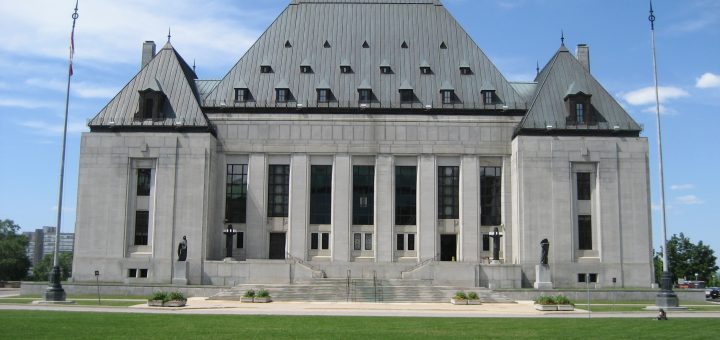Highwood Congregation v Wall: Decisions About the World’s Greatest Hockey Player are Not Subject to Judicial Review

Highwood Congregation of Jehovah’s Witnesses (Judicial Committee) v Wall, 2018 SCC 26 [Wall, 2018 SCC], examined which kinds of decision-making bodies are subject to judicial review for procedural fairness. A recent line of decisions had suggested that, under certain conditions, some private actors (such as political parties, churches, and soccer clubs) may be subject to the duty of procedural fairness. These conditions include private actors that have been incorporated by a private statute, private decisions that affected a large number of people, and private decisions that were held to be contrary to natural justice. The decision in Wall ends the expansionary trend and clarifies that judicial review is only available for decisions of “state” bodies that are of a “sufficiently pubic character” (Wall, 2018 SCC, para 14). Wall leaves the definitions of “state” and “sufficiently public” undefined.
Private Associations and Judicial Review
The Highwood Congregation of Jehovah’s Witnesses (“the Congregation”) is an association of approximately one hundred Jehovah’s Witnesses in Calgary, Alberta. Randy Wall was a member of the Congregation from 1980 to 2014, when the Judicial Committee “disfellowshipped” him for behaviour that it deemed to be inconsistent with church norms. Under the Congregation’s rules, disfellowshipped members may attend congregational meetings, but they may speak only to their immediate family and must limit their conversations to non-spiritual matters. After the decision to expel him, many Congregation members ostracized Wall, and because half of his clients were other Jehovah’s Witnesses from his community, he lost a significant portion of his business as a realtor.
Wall unsuccessfully appealed his disfellowshipment to another panel in the Congregation. He then sought judicial review of the decision, claiming that the Judicial Committee had breached its duty of procedural fairness. An earlier post, written in November 2017 during the hearing of the Congregation’s appeal to the Supreme Court, details the facts of the case at trial.
The trial judge noted that the Congregation is an unincorporated, voluntary association run by a group of volunteers and elders, without a statutory foundation, articles of association, or by-laws. Nonetheless, the judge ruled that, because the Congregation’s decision affected Wall’s civil rights by its negative impact on his business, the court had jurisdiction to undertake judicial review and issue remedies.
The majority in Wall v Judicial Committee of the Highwood Congregation of Jehovah’s Witnesses at the Alberta Court of Appeal (“ABCA”) 2016 ABCA 255 [Wall, 2016 ABCA], agreed with the trial decision, ruling that courts may intervene in decisions of private actors when those decisions affect property or civil rights. The ABCA went further and said that even where no property or civil rights are engaged, courts may still intervene in the decisions of voluntary associations where there is a breach of the rules of natural justice or where the complainant has exhausted internal dispute resolution processes. The majority cited a line of cases that it had interpreted as suggesting a freestanding right to procedural fairness. Justice Wakeling dissented, claiming that the Congregation’s decision to disfellowship Wall was not subject to judicial review because the Judicial Committee was a private actor. By way of a (very Canadian) example, Justice Wakeling said that “a hockey fan cannot invoke the judicial process to resolve a dispute with another diehard hockey fan” regarding who is the greatest player of all time – Wayne Gretzky or Gordie Howe – because there is no legal right that compels a court to identify the world’s greatest hockey player (Wall, 2016 ABCA, para 82). Finally, Justice Wakeling ruled that because of the ecclesiastical nature of Wall’s dispute, it was inappropriate for a court to review it, and he had no cause of action.
The Supreme Court Narrows the Scope of Judicial Review for Procedural Fairness
A unanimous Supreme Court (“SCC” or “the Court”) sided with Justice Wakeling’s dissent. Justice Rowe noted that, while the “courts are not strangers to the review of decision making on the basis of procedural fairness,” the ability of courts to review conduct is “subject to certain limits” (Wall, para 12). These limits included the following: first, judicial review is reserved for state action. Second, there is no freestanding right to procedural fairness, and courts may interfere only where legal rights are at stake. Finally, even where review is available, the courts will consider only those issues that are justiciable.
The SCC ruled unequivocally that there was no freestanding right to procedural fairness with respect to decisions taken by voluntary associations. According to the SCC, in the ABCA’s finding to the contrary, the majority mistook cases that involved underlying legal rights, such as wrongful dismissal or a statutory cause of action, for cases that otherwise supported a freestanding right to procedural fairness. Justice Rowe added that jurisdiction for review can only be established where legal rights are at stake. For the same reasons, he ruled that the ABCA majority had misread Lakeside Colony of Hutterian Brethren v. Hofer [1992] 3 SCR 165, when it cited the case to ground the proposition that courts could review the decisions of voluntary organizations for procedural fairness when the issues raises were, even without property or contractual rights in issue, “sufficiently important.” Justice Rowe reiterated that what is required is a “legal right of sufficient importance” (Wall, 2018 SCC, para 27).
The SCC concluded that because the Congregation was not a public decision-maker, was not exercising statutory authority or otherwise acting in a “sufficiently public” manner, and because its decision did not engage a legal right, Wall’s membership in the religious organization had to remain free from court intervention. The court also addressed the question of whether ecclesiastical issues were justiciable, and ruled in the negative. And although the court clarified that only state action with a “sufficiently public character” was subject to judicial review, it provided few guidelines for identifying “state” action and “sufficiently public character.”
Court Addresses Public-Private Confusion
Justice Rowe attributed the confusion around the public-private distinction to Air Canada v. Toronto Port Authority, 2011 FCA 247 [Air Canada], a decision that set out eight factors relevant to determining whether “a matter is coloured with a public element, flavour or character sufficient to bring it within the purview of public law” (Air Canada, para 60). A main problem he identified in some of the lower courts’ case law was a conflation of “public” in a generic sense and “public” in the public law sense. Namely, he said that “simply because a decision impacts a broad segment of the public does not mean that it is public in the administrative law sense of the term” (Wall, 2018 SCC, para 20).
Regarding the public-private distinction, Air Canada established that even public bodies may make some decisions that are not public but private in nature (such as renting premises or hiring staff) and that these decisions are not subject to judicial review because, when making them, the public body does not exercise “a power central to the administrative mandate given to it by Parliament” (Wall, 2018 SCC para 20). Justice Rowe clarified that the proposition that the private decisions of a public body will not be subject to judicial review “does not make the inverse true:” it does not mean that a private body’s “public” decisions will be reviewable by a court (in the sense that they are “sufficiently important” to take on a public nature, for example). Justice Rowe emphasized that what is relevant is whether it is the legality of “state” decision-making that is at issue.
While Wall did not overrule the Air Canada criteria for characterizing the decision-maker’s “public” nature, it emphasized that what Air Canada “actually dealt with [was] whether certain public entities were acting as a federal board, commission or tribunal such that the judicial review jurisdiction of the Federal Court was engaged” (Wall, 2018 SCC, para 21), rather than whether an actor had a “sufficiently public character. Wall did establish, however, that the scope of judicial review on procedural grounds is narrower than what some of the lower court decisions have previously held. Although the Court repeatedly emphasized that only state actors exercising authority of a “sufficiently public character” will be subject to judicial review, it left the criteria to determine “sufficiently public character” to the common law.
Final Thoughts
In Justice Wakeling’s dissent at the ABCA, he wrote that “there is good reason to conclude that any membership decision of a religious association is immune from judicial review for constitutional reasons” (Wall, 2016 ABCA, para 105). Although many of the dozen interveners in the case at the Supreme Court argued in support of the Congregation’s decision being beyond the reach of judicial review on constitutional grounds, the Supreme Court left constitutional arguments out of the ruling. Justice Rowe did, however, cite Justice Abella in Bruker v Marcovitz, 2007 SCC 54, for the proposition that “the fact that a dispute has a religious aspect does not by itself make it non-justiciable.”
Wall did not establish that a decision-maker with a religious aspect can never be subject to judicial review. It did, however, provide three criteria limiting the disputes which can be subject to review for procedural fairness. Wall established unequivocally that judicial review is about “state action” and that courts would not get involved in private “matters of religious dogma.” However, the Court refrained from addressing constitutional arguments and left definitions of “public” and “state” action “of a sufficiently public character” open. Although Wall clarifies that private actors are not subject to judicial review unless there is a legal right at stake, the definition of what constitutes “state action” and “sufficiently public character” are left unaddressed. This gap implicitly refers questions over the public-private distinction to the common law.






Join the conversation